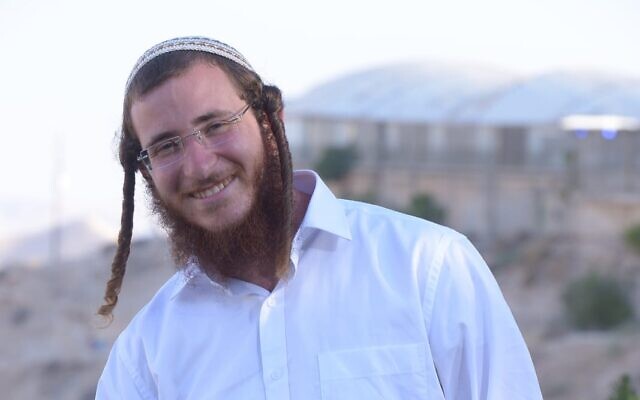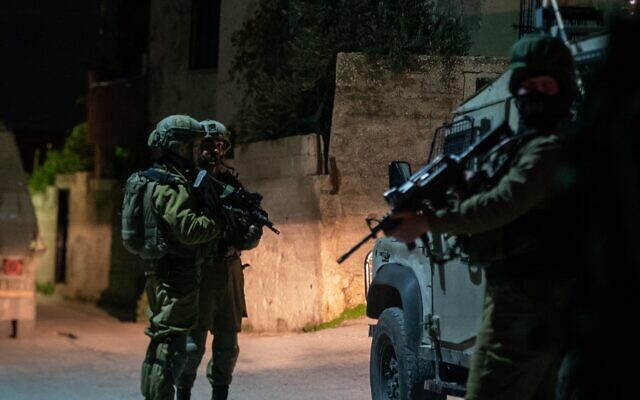
Forces enter Palestinian town of Silat al-Harithiya, hand demolition order to family of two men suspected of killing Yehuda Dimentman last week
Today, 8:43 am
By JUDAH ARI GROSS
SOURCE: THE TIMES OF ISRAEL
IDF soldiers operating in the West Bank Palestinian town of Silat al-Harithiya, December 20, 2021. (IDF spokesperson)
Israeli security forces measured the home of two Palestinian brothers suspected of carrying out a shooting attack in the West Bank last week that killed Yehuda Dimentman and injured two other Israelis, in the first step before the building’s demolition, the military said Monday.
Troops entered the town of Silat al-Harithiya, near Jenin in the northern West Bank, where they were met with heavy gunfire and rioting, the Israel Defense Forces said in a statement.
“During the activities, massive gunfire was directed at IDF soldiers, who returned fire,” the military said.
Dozens of Palestinians also threw stones and explosive devices at security forces, who responded with riot dispersal weapons, the IDF said.
There were no injuries to Israeli forces.
As a punitive policy, Israel demolishes the homes of Palestinians accused of carrying out deadly terror attacks. The military first measures or maps the building in order to determine the best way to raze the structure. The suspects’ families are notified in advance of the demolition, giving them a chance to appeal to Israel’s High Court of Justice. These attempts rarely succeed, though in some cases the court can limit the demolition order to only the parts of the house used by the terrorist.
Large numbers of forces took part in the raid, according to Palestinian media reports.
Videos shared on social media showed IDF troops streaming into the town and gunmen firing at IDF units.
The Ma’an news agency identified the home as that of Ahmed Muhammad Yassin Jaradat, the father of brothers Ghaith and Omar, who are suspected of carrying out the deadly shooting, with help from a number of accomplices. The Shin Bet security service said the suspects were members of the Palestinian Islamic Jihad terror group.
According to Palestinian reports, the residents of the home were handed documents warning them to evacuate the premises ahead of its demolition and the family began removing their furniture.
The two brothers and four other suspects were arrested during a predawn raid on Sunday in Silat al-Harithiya by the IDF, Shin Bet security service and Israel Police’s Yamam counterterrorism unit. They were all handed over to the Shin Bet for interrogation.
The Shin Bet said troops also recovered weapons suspected to have been used in Thursday’s attack, along with at least one other that was in the possession of the cell, including two M-16 rifles and a Carlo-style submachine gun, a locally produced makeshift weapon. Police later released photos of the guns. Yehuda Dimentman. (Courtesy)
Yehuda Dimentman. (Courtesy)
Terrorists opened fire at the car Dimentman was traveling in with two other men, killing him and lightly wounding them, as they left the Homesh outpost. A military official said their car was ambushed from the side of the road.
Dimentman was a student at an yeshiva, or religious school, near where the attack took place. Homesh is a former settlement that was meant to have been abandoned as part of a 2005 eviction—the so-called “disengagement”—but is now the site of the illegally operated yeshiva.
The 25-year-old was a father of a nine-month-old son and lived in the West Bank settlement of Shavei Shomron.
 IDF soldiers operating in the West Bank Palestinian town of Silat al-Harithiya, December 20, 2021. (IDF spokesperson)
IDF soldiers operating in the West Bank Palestinian town of Silat al-Harithiya, December 20, 2021. (IDF spokesperson)
The past few weeks have seen a rise in Palestinian terror attacks, with four taking place in Jerusalem alone, including a deadly shooting committed by a member of Hamas.
There has also been a noted rise in settler violence toward Palestinians.
Israeli authorities often take punitive action such as home demolitions before a conviction in cases of terrorist attacks. Israel defends the practice of razing the family homes of attackers as a deterrent against future assaults, and officials have argued that speed is essential, claiming that the deterrent factor degrades over time.
Over the years, however, a number of Israeli defense officials have questioned the efficacy of the practice, and human rights activists have denounced it as unfair collective punishment.